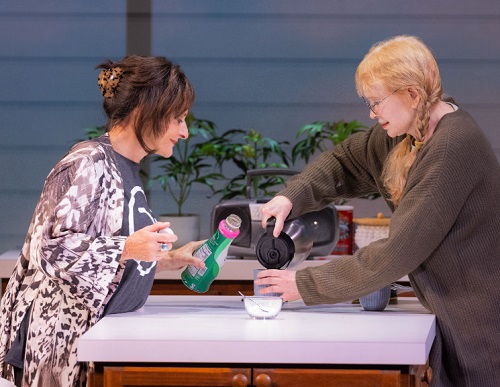NYC News
Review: Mia and Patti Bring Down the House in the Roommate
September 12, 2024, 9:07.00 pm ET

By Brian Scott Lipton
SitSitcom. Rom-com. Con-com. These descriptions each feel apt at various points during “The Roommate,” Jen Silverman’s crowd-pleasing two-hander, now making a belated Broadway debut at the Booth Theater nearly a decade after being unveiled at the Humana Festival.
Directed with his usual finesse by Jack O’ Brien and beautifully designed by Bob Crowley (who has created a spacious, airy Midwest farmhouse) and lit gorgeously by Natasha Katz, the play serves mostly as a showcase for the spectacular Mia Farrow (in a long-awaited return to the stage) and her real-life bestie, Patti LuPone, each of whom do their considerable best to both illuminate and overcome Silverman’s often facile writing.
As has often been true throughout her long career, Farrow has been cast once again as a wide-eyed innocent (despite being close to 80 and living an offstage life that includes her Hollywood upbringing, her teenage stardom, and her troubled relationships with Frank Sinatra and Woody Allen, among other trials) and makes it really work!
Here, she brings remarkable inventiveness to the role of the unbelievably naïve Iowa divorcee Sharon, who seems to have experienced remarkably little life in her 65 years -- we’re not sure she owns a TV or has ventured anywhere but to New York once to visit her son -- and has essentially given up on making the most of her golden years.
Moreover, it’s not entirely clear why she is taking in a housemate or why she agreed ---- on what appears to be the basis of one (obviously short) phone call -- to allow Robyn (LuPone) to move in. A tough-talking broad most recently from the Bronx, Robyn arrives with boxes of possessions and an equal amount of “secrets,” including the fact that she’s a lesbian and a vegan (both of which we learn almost immediately) to the revelation that, like Sharon, she has a grown child with whom she has a distant relationship.
The part essentially requires LuPone to do what she traditionally does – offer up equal parts sarcasm and vulnerability – and no one does it better. Still, it might have been truly interesting to see someone cast against type as Robyn. Further, the pair’s undeniable chemistry undercuts what should be some tension early in the play, when Robyn really seems to be looking for nothing more than a place to stay – or more accurately, escape – and not a new friend.
Still, it comes as no surprise that the two women ultimately change each other’s lives, and watching Sharon “blossom” under Robyn’s all-too-worldly tutelage is nothing short of delightful, even when Sharon takes her lessons to rather unbelievable extremes. Indeed, Farrow makes Sharon’s joy in finally embracing new experiences, ill-chosen or otherwise, so palpable that you can probably feel it in the last row of the mezzanine.
Lastly, if one can’t be sure of what the ending to this odd-couple relationship will be, I’m not sure Silverman ever was either. Unfortunately, she’s written a long series of final scenes (which ultimately make the 100-minute play feel far longer), the last of which gives the audience an almost unnecessary resolution. Perhaps I would have more appreciation for “The Roommate” if it gave us some room to decide what happened for ourselves.
LATEST NYC NEWS

The Lobster Cone Takes New York City by Storm
December 21, 2024, 9:33 am ET
If you haven’t been to Bryant Park for Red Hook Lobster Pound’s new “Lobster Cone,” you may want to make a trip before the Winter Village closes up shop after the holidays. ... READ MORE

Frrrozen Decadence: Last Crumb x Serendipity3 Unveil the Ultimate Holiday Cookie
December 20, 2024, 5:54 pm ET
Last Crumb, the viral Hollywood cookie sensation, has teamed up with iconic NYC eatery Serendipity3 to debut the Frrrozen Hot Chocolate Cookie. Inspired by Serendipity3’s legendary dessert, th... READ MORE

Angelina Bakery Brings Holiday Cheer with Toys for Tots Drive at Times Square
December 20, 2024, 5:54 pm ET
Angelina Bakery, renowned for its Italian-inspired treats, is celebrating the soft opening of its 7 Times Square location with a heartwarming Toys for Tots drive this Sunday and Monday. Partnering ... READ MORE


 Sign up for our newsletter !
Sign up for our newsletter !